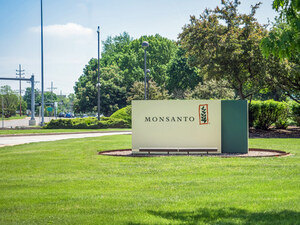LAWSUITS NEWS & LEGAL INFORMATION
Monsanto RoundUp and Cancer
Were you looking for Monsanto Facing Roundup Consumer Fraud Class Action Lawsuit lawsuits?
By Jane Mundy
Roundup, a weed killer made by Monsanto, is believed to “probably” cause cancer. Recent evidence indicates that glyphosate, the active chemical in Roundup, is the probable human carcinogen. Some individuals diagnosed with Non-Hodgkin’s Lymphoma and Leukemia are filing claims against the agricultural giant, which has resulted in Monsanto facing Roundup consumer fraud class action lawsuits and Roundup false advertising lawsuits.
 Monsanto is a U.S. agrochemical and agricultural biotechnology corporation that sells their products to farmers worldwide. Since 1974 (after it stopped making Agent Orange and its pesticide DDT was banned) Monsanto has been selling to both farmers and consumers its blockbuster herbicide Roundup, which is a weed killer containing glyphosate. By 2001, about 85-90 million pounds of Roundup weed killer was used in American agriculture. By 2007 that amount more than doubled.
Monsanto is a U.S. agrochemical and agricultural biotechnology corporation that sells their products to farmers worldwide. Since 1974 (after it stopped making Agent Orange and its pesticide DDT was banned) Monsanto has been selling to both farmers and consumers its blockbuster herbicide Roundup, which is a weed killer containing glyphosate. By 2001, about 85-90 million pounds of Roundup weed killer was used in American agriculture. By 2007 that amount more than doubled.
Due to recent scientific studies and research, some countries have banned products containing glyphosate, including Roundup. In March 2016, several member states in the European Union reached a deadlock in a 15-year approval for Roundup.
In February 2016 the FDA said it would start testing for Roundup residue in food.
A number of Roundup cancer studies have found evidence linking the weed killer’s main ingredient, glyphosate, to serious side effects. The most serious Roundup side effects include:
Lawsuits have been filed across the US alleging that Monsanto has known about the link between glyphosate and cancer since the 1980's but failed to inform the public about the danger. A number of plaintiffs are asking for their cases to be consolidated into a multidistrict litigation (MDL) in Los Angeles, California. Monsanto is asking federal judges to centralize 21 Roundup lawsuits into an MDL in the Southern District of Illinois.
As of August 4, 2016 at least 26 Roundup lawsuits have been filed nationwide by 12 different law firms. Monsanto says it is facing at least 200 more lawsuits after its motions for dismissal were denied in some cases. Courthouse News (July 1, 2016) reports that a federal judge in Honolulu denied Monsanto's request to dismiss a claim brought by Christine Shephard, a former coffee farmer who claims Roundup caused her non-Hodgkin lymphoma. Christine and Kenneth Shephard filed their lawsuit just one week after Monsanto filed a claim in California that attempted to prevent the addition of glyphosate from the state's list of known carcinogens.
In May 2016, Four Nebraskan agricultural workers filed a lawsuit against Monsanto, blaming its Roundup weed killer for their non-Hodgkin lymphoma after many years of exposure. The lawsuit also accuses Monsanto of purposely misleading consumers about the safety of Roundup and its active ingredient glyphosate. Further, Monsanto mislabeled the product in defiance of the "body of recognized scientific evidence linking the disease to exposure to Roundup."
California farmer Jack McCall used Monsanto Roundup for nearly 30 years, during which time he developed cancer symptoms. After McCall died in December 2015 from non-Hodgkin lymphoma, his widow filed a wrongful death lawsuit against Monsanto. (Case No. 2:16:cv-01609)
In April 2015, a Roundup class action lawsuit was filed in California, accusing Monsanto of false advertising for claiming that Roundup is harmless to human health because “glyphosate targets an enzyme found in plants but not in people or pets.” (Case No: BC78 942)
March 2015: WHO studied the research on Roundup cancer links and concluded it is “probably carcinogenic to humans.” Research shows that Monsanto has known Roundup weed killer is carcinogenic for several decades, but buried the risks as sales of Roundup increased.
October 2008: The International Journal of Cancer published a Swedish study that concluded exposure to glyphosate doubled the risk of developing non-Hodgkin’s lymphoma within less than 10 years.
September 2003: A US study in Occupational and Environmental Medicine found over 3,400 farmworkers in the midwest had higher rates of non-Hodgkin’s lymphoma associated with glyphosate exposure.
November 2001: A Canadian study published in Cancer Epidemiology Biomarkers found a dose-response relationship between glyphosate exposure and non-Hodgkin’s lymphoma.
Roundup still remains the most widely used herbicide in the US and worldwide. Glyphosate products are used on more than 50 percent of American croplands and generate $6 billion in revenue for Monsanto every year. Monsanto denies any link between Roundup and cancer.
Last updated on
FREE MONSANTO ROUNDUP LAWSUIT EVALUATION
Send your Monsanto RoundUp claim to a lawyer who will review your claim at NO COST or obligation.
GET LEGAL HELP NOW
GET LEGAL HELP NOW
Monsanto RoundUp
 Monsanto is a U.S. agrochemical and agricultural biotechnology corporation that sells their products to farmers worldwide. Since 1974 (after it stopped making Agent Orange and its pesticide DDT was banned) Monsanto has been selling to both farmers and consumers its blockbuster herbicide Roundup, which is a weed killer containing glyphosate. By 2001, about 85-90 million pounds of Roundup weed killer was used in American agriculture. By 2007 that amount more than doubled.
Monsanto is a U.S. agrochemical and agricultural biotechnology corporation that sells their products to farmers worldwide. Since 1974 (after it stopped making Agent Orange and its pesticide DDT was banned) Monsanto has been selling to both farmers and consumers its blockbuster herbicide Roundup, which is a weed killer containing glyphosate. By 2001, about 85-90 million pounds of Roundup weed killer was used in American agriculture. By 2007 that amount more than doubled.Due to recent scientific studies and research, some countries have banned products containing glyphosate, including Roundup. In March 2016, several member states in the European Union reached a deadlock in a 15-year approval for Roundup.
Roundup Cancer and Those at Risk
Exposure to Roundup is not limited to farmers and agricultural workers. It is widely sold as an “all purpose” weed killer to consumers. For instance, a California federal judge on July 7, 2016 told Monsanto it must face charges from a consumer who alleges the glyphosate in Roundup lawn spray caused her to develop non-Hodgkin’s lymphoma.In February 2016 the FDA said it would start testing for Roundup residue in food.
A number of Roundup cancer studies have found evidence linking the weed killer’s main ingredient, glyphosate, to serious side effects. The most serious Roundup side effects include:
- Leukemia: Multiple myeloma, myeloma
- Lymphoma: Non-Hodgkin’s, Hodgkin’s
- Parkinson’s Disease
- Bone Cancer
- Colon Cancer
- Kidney Cancer
- Liver Cancer
- Melanoma
- Pancreatic Cancer
- Thyroid Cancer
Monsanto Lawsuits
In 1996, the New York Attorney General filed a Roundup lawsuit against Monsanto for falsely advertising the weed killer as being “safer than table salt” and “practically non-toxic” to mammals, birds and fish. The lawsuit claimed that Monsanto was falsely telling farmers and agricultural workers that Roundup was non-toxic.Lawsuits have been filed across the US alleging that Monsanto has known about the link between glyphosate and cancer since the 1980's but failed to inform the public about the danger. A number of plaintiffs are asking for their cases to be consolidated into a multidistrict litigation (MDL) in Los Angeles, California. Monsanto is asking federal judges to centralize 21 Roundup lawsuits into an MDL in the Southern District of Illinois.
As of August 4, 2016 at least 26 Roundup lawsuits have been filed nationwide by 12 different law firms. Monsanto says it is facing at least 200 more lawsuits after its motions for dismissal were denied in some cases. Courthouse News (July 1, 2016) reports that a federal judge in Honolulu denied Monsanto's request to dismiss a claim brought by Christine Shephard, a former coffee farmer who claims Roundup caused her non-Hodgkin lymphoma. Christine and Kenneth Shephard filed their lawsuit just one week after Monsanto filed a claim in California that attempted to prevent the addition of glyphosate from the state's list of known carcinogens.
In May 2016, Four Nebraskan agricultural workers filed a lawsuit against Monsanto, blaming its Roundup weed killer for their non-Hodgkin lymphoma after many years of exposure. The lawsuit also accuses Monsanto of purposely misleading consumers about the safety of Roundup and its active ingredient glyphosate. Further, Monsanto mislabeled the product in defiance of the "body of recognized scientific evidence linking the disease to exposure to Roundup."
California farmer Jack McCall used Monsanto Roundup for nearly 30 years, during which time he developed cancer symptoms. After McCall died in December 2015 from non-Hodgkin lymphoma, his widow filed a wrongful death lawsuit against Monsanto. (Case No. 2:16:cv-01609)
In April 2015, a Roundup class action lawsuit was filed in California, accusing Monsanto of false advertising for claiming that Roundup is harmless to human health because “glyphosate targets an enzyme found in plants but not in people or pets.” (Case No: BC78 942)
Monsanto Fraud
EPA determined that laboratories hired by Monsanto to conduct Roundup studies committed fraud. Monsanto hired Craven Laboratories in 1991 to perform studies for Roundup. Later that year, the owner of Craven Laboratories and three of its employees were indicted for fraudulent laboratory practices. Industrial Bio-Test Laboratories (IBT) was hired by Monsanto to study Roundup’s toxicity levels in the early 1970s. EPA audited the data from IBT, found “routine falsification of data” and convicted IBT executives of fraud.Roundup Statute of Limitations
In the Shephard lawsuit above, Monsanto said Christine Shephard suspected Roundup long before filing the action on Feb. 2, 2016, and as a result should be dismissed as outside the two-year statute of limitations for tort claims. But US District Judge Michael Seabright wrote that “it is not apparent on the face of the complaint that the statute of limitations has run, especially considering the allegations regarding the 2015 designation [of Roundup as a probable carcinogen] by the WHO."Monsanto Roundup Studies and Research
Recent studies by researchers and the World Health Organization (WHO) suggest that Roundup can cause cancer and other serious health problems.March 2015: WHO studied the research on Roundup cancer links and concluded it is “probably carcinogenic to humans.” Research shows that Monsanto has known Roundup weed killer is carcinogenic for several decades, but buried the risks as sales of Roundup increased.
October 2008: The International Journal of Cancer published a Swedish study that concluded exposure to glyphosate doubled the risk of developing non-Hodgkin’s lymphoma within less than 10 years.
September 2003: A US study in Occupational and Environmental Medicine found over 3,400 farmworkers in the midwest had higher rates of non-Hodgkin’s lymphoma associated with glyphosate exposure.
November 2001: A Canadian study published in Cancer Epidemiology Biomarkers found a dose-response relationship between glyphosate exposure and non-Hodgkin’s lymphoma.
Roundup still remains the most widely used herbicide in the US and worldwide. Glyphosate products are used on more than 50 percent of American croplands and generate $6 billion in revenue for Monsanto every year. Monsanto denies any link between Roundup and cancer.
Monsanto RoundUp Legal Help
If you or a loved one has suffered similar damages or injuries, please click the link below and your complaint will be sent to a lawyer who may evaluate your claim at no cost or obligation.Last updated on
MONSANTO ROUNDUP LEGAL ARTICLES AND INTERVIEWS
Monsanto Wins in Philadelphia's Roundup Mass Tort

Bayer Hopeful Farm Bill will End Roundup Lawsuits

New Study Indicates Monsanto’s Roundup Linked to Infertility


October 11, 2024
Bayer’s Monsanto had a good September. A Philadelphia jury found that, although Monsanto's Roundup weedkiller was defective, it did not cause plaintiff Ryan Young's non-Hodgkin lymphoma. It determined that Young did not provide sufficient evidence to prove that Roundup was the cause of his cancer. This is the fifth Monsanto Roundup lawsuit verdict in Philadelphia and the second win for the agrochemical company since trials began here about a year ago. READ MORE
Bayer Hopeful Farm Bill will End Roundup Lawsuits

August 14, 2024
Bayer has aggressively lobbied the upcoming Farm Bill, which Congress has to adopt every five years to sustain federal agriculture and nutrition programs. The ag chemical giant is counting on the provision that would result in only EPA-approved labels on pesticide packaging, such as Monsanto Roundup – amounting to a “Get out of jail free” card for pesticide companies, says one victims’ rights representative. READ MORE
New Study Indicates Monsanto’s Roundup Linked to Infertility

July 17, 2024
A new study has found glyphosate, the active ingredient in Monsanto’s Roundup, in human sperm: it found that more than 55 percent of sperm samples from a French infertility clinic contained high levels of glyphosate. Researchers warn that glyphosate can contribute to infertility, damage DNA in the sperm, and could cause health problems in the men’s offspring. READ MORE
READ MORE Consumer Fraud Settlements and Legal News
READ MORE Defective Products Settlements and Legal News
READ MORE Environment Settlements and Legal News
READ MORE Personal Injury Settlements and Legal News
READ MORE Defective Products Settlements and Legal News
READ MORE Environment Settlements and Legal News
READ MORE Personal Injury Settlements and Legal News

READER COMMENTS
Judi Sikarskie
on
I live on a farm and used Round-up for several years to clear brush as well as using around the house in the garden and flower beds until the warnings came out in late 1990's. Use of Round-up began with purchase of the farm property in 1986. I called Monsanto to discern any toxicity with the chemical at that time. The woman assured me that Round-up was the only herbicide approved for use in California and the only danger if my children ran through a recent application would be if they then walked on the lawn in which case there may be a little dieback of the lawn.I was diagnosed and had surgery for a Level 2 melanoma. This was in 1998 however claims against Monsanto did not exist at that point.
I also have suffered from gluten intolerance and gut issues associated with die-off of gut biota with inhalation of glyphosate. I am a veterinarian and have an understanding of physiology and pharmacology.
Elijah Mccurley
on
My question is could she qualify with pancreatic cancer on a class action suit?
Michelle Erkenbeck
on
rosemary schroeder
on
Live in Illinois, family uses Monsanto Weed killer for years, I work in the yard all the time. Am a victim of 2 breast cancer/lymph node surgeries & radiation treatments, 1 colon cancer surgery, and a 2 yr process of chemo treatments of Rituxin for diagnosed non-Hodgkins lymphoma Waldstrom's syndrome macroglobalinemea.
al stanton
on
Robeet D Ringstad
on
Angie
on
By the way he won't be using it anymore after reading about it on this website. Thank you for the information.
Jeff Ruth
on